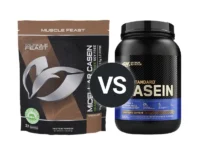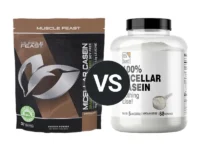Knowledge BaseYou're Questions Answered
Does casein protein powder expire?
Yes, casein protein powder, like other dietary supplements, does expire. Typically, its shelf life ranges from 1 to 2 years, depending on the storage conditions and the specific product. Proper storage is essential for maintaining the quality, freshness, and effectiveness of casein protein powder. To preserve its shelf life, it is crucial to keep the powder in a cool, dry place, away from direct sunlight, heat, and moisture. Once opened, storing the powder in an airtight container is important to prevent exposure to air and moisture, which can cause spoilage and degradation over time1.
How to Tell if Casein Protein Powder Has Expired
- Changes in Appearance
If the powder shows signs of discoloration or has developed clumps, it may have been exposed to moisture or air, which indicates it is no longer safe to use2. - Off Smells
Fresh casein protein powder should have a neutral or mild scent. If you notice a sour or rancid smell, it is a strong indication that the product has expired and should be discarded2. - Texture
Expired casein protein powder might feel gritty or uneven, which can occur when the protein structure degrades over time. This change in texture is another signal that the product should not be consumed1.
Risks of Using Expired Casein Protein Powder
- Reduced Nutritional Value
Over time, the protein content in casein powder may break down, leading to a reduced efficacy in supporting muscle repair and recovery. Consuming expired protein powder means you may not receive the intended nutritional benefits3. - Health Risks
Expired protein powders can be at risk of bacterial or mold growth, especially if improperly stored. This can lead to digestive issues or foodborne illnesses. Always discard protein powder that shows signs of spoilage4.
Casein protein powder generally has a shelf life of 1 to 2 years if stored properly in a cool, dry place. Always check the expiration date and inspect the powder for any signs of spoilage, such as odor, texture, or discoloration. Using expired casein protein powder can diminish its nutritional value and may pose health risks, so it’s best to consume it within the recommended time frame and follow proper storage practices to ensure safety and quality1.
- Hoffman, J. R., & Falvo, M. J. (2004). Protein – Which is Best? Journal of Sports Science and Medicine, 3(3), 118-130.
- Phillips, S. M., & Van Loon, L. J. (2011). Dietary protein for athletes: From requirements to optimum adaptation. Journal of Sports Sciences, 29(sup1), S29-S38.
- Kerksick, C. M., & Leutholtz, B. (2005). Protein. In I. Wolinsky & J. A. Driskell (Eds.), Sports Nutrition: Energy Metabolism and Exercise (pp. 85-98). CRC Press.
- Boirie, Y., et al. (1997). Slow and fast dietary proteins differently modulate postprandial protein accretion. Proceedings of the National Academy of Sciences, 94(26), 14930-14935.
Related Questions
Related Reviews

Your Answer
We are a participant in the Amazon Services LLC Associates Program, an affiliate advertising program designed to provide a means for us to earn fees by linking to Amazon.com and affiliated sites.



